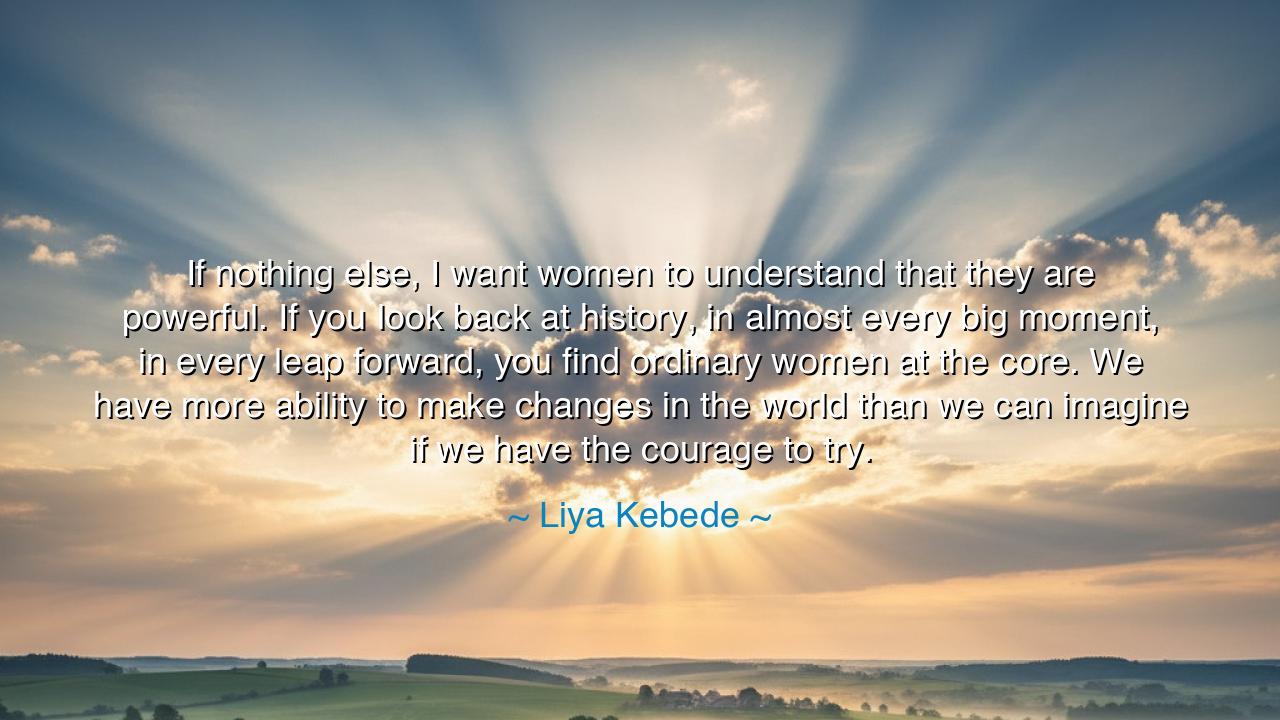
If nothing else, I want women to understand that they are
If nothing else, I want women to understand that they are powerful. If you look back at history, in almost every big moment, in every leap forward, you find ordinary women at the core. We have more ability to make changes in the world than we can imagine if we have the courage to try.






“If nothing else, I want women to understand that they are powerful. If you look back at history, in almost every big moment, in every leap forward, you find ordinary women at the core. We have more ability to make changes in the world than we can imagine if we have the courage to try.” Thus spoke Liya Kebede, model, humanitarian, and advocate for maternal health — a woman whose life stands as living proof of her own words. In this luminous statement, she calls upon the daughters of humanity to awaken to their power — not the loud, domineering power of conquest, but the quiet, enduring power of creation, of compassion, and of courage. Her voice, though gentle, resounds like a bell across the centuries, reminding us that the history of human progress is, in truth, the history of women who dared.
The origin of this wisdom lies in Kebede’s own journey — a path marked by grace, determination, and service. Born in Ethiopia, she rose to international fame not merely as a face of beauty, but as a force for change. She founded the Lemlem Foundation, dedicated to improving women’s health and livelihoods across Africa, and became a global advocate for maternal rights through her work with the World Health Organization. Yet, in her success, she never forgot her roots nor the struggles of women who labor unseen. Her words, then, are not the abstract musings of privilege, but the testimony of one who has witnessed both hardship and triumph — one who knows that true power does not arise from circumstance, but from courage.
When Liya Kebede speaks of “ordinary women at the core” of history’s greatest moments, she speaks the truth that much of the world forgets. The chronicles of kings and conquerors may fill the books, but behind every throne, every movement, every act of progress stand the women who raised the children, healed the sick, fed the hungry, and kept the light of hope alive. Who remembers the midwives of ancient villages, the mothers who endured famine to keep their children alive, the workers who held nations together in times of war? The world may call them ordinary, but they are the unseen architects of civilization — the true foundations of change.
Consider the story of Rosa Parks, a quiet seamstress whose simple act of defiance ignited a revolution. When she refused to surrender her seat on a segregated bus, she did not shout, nor did she wield weapons. She merely stood — or rather, sat — in her truth. Her courage, born of dignity and conviction, became the spark that kindled the civil rights movement. Rosa Parks was not a ruler, nor a general; she was an ordinary woman, yet her act reshaped the moral landscape of a nation. So too have countless women across history — from Marie Curie, who illuminated the invisible forces of nature, to Malala Yousafzai, who raised her voice for education in the face of tyranny — proven that courage in one heart can awaken change in millions.
In every era, women have carried the torch of progress, often unacknowledged but always essential. They have endured silence and limitation, yet within that silence they have sown the seeds of transformation. Their power is not merely physical or political — it is spiritual, moral, and creative. It is the power to nurture life and ideas, to build and rebuild, to love even when the world is unloving. And Kebede’s wisdom reminds us that this power is not confined to the extraordinary few; it belongs to all women, waiting to be claimed through courage — the courage to believe that one’s voice, one’s action, one’s compassion, can change the world.
Yet, as Kebede wisely declares, courage is the key. The world, still bound by ignorance and fear, often tells women that they are powerless, that their dreams are too great, their strength too dangerous. To rise against such voices requires not anger, but courage — the courage to stand in one’s truth, to persevere, to defy invisibility. For every woman who doubts herself, Kebede’s words are a call to remember: you were born powerful. The flame of creation burns in your heart; the history of endurance flows in your blood. The world may try to make you forget, but you must remember — and act.
Therefore, my children, take this lesson to heart: greatness is not granted; it is chosen. Power does not come from privilege; it arises from conviction. Whether you are a mother, a student, a worker, or a dreamer, you possess within you the same divine spark that moved the heroines of the past. Look upon history not as distant legend, but as mirror and inheritance. When fear whispers, answer with action. When doubt clouds your path, walk forward anyway. Courage, not perfection, is the measure of strength.
And so, as Liya Kebede teaches, let the women of the world remember their inheritance of power — and let the men of the world honor it. For in every act of compassion, in every word of truth, in every moment of bravery, the world takes another step toward light. Love, courage, and faith — these are the tools with which women have always reshaped history. To live by them is to continue the great work of creation itself. And when we do, we shall find, as Kebede knew, that the power to change the world was never far from us — it was within us all along.






AAdministratorAdministrator
Welcome, honored guests. Please leave a comment, we will respond soon